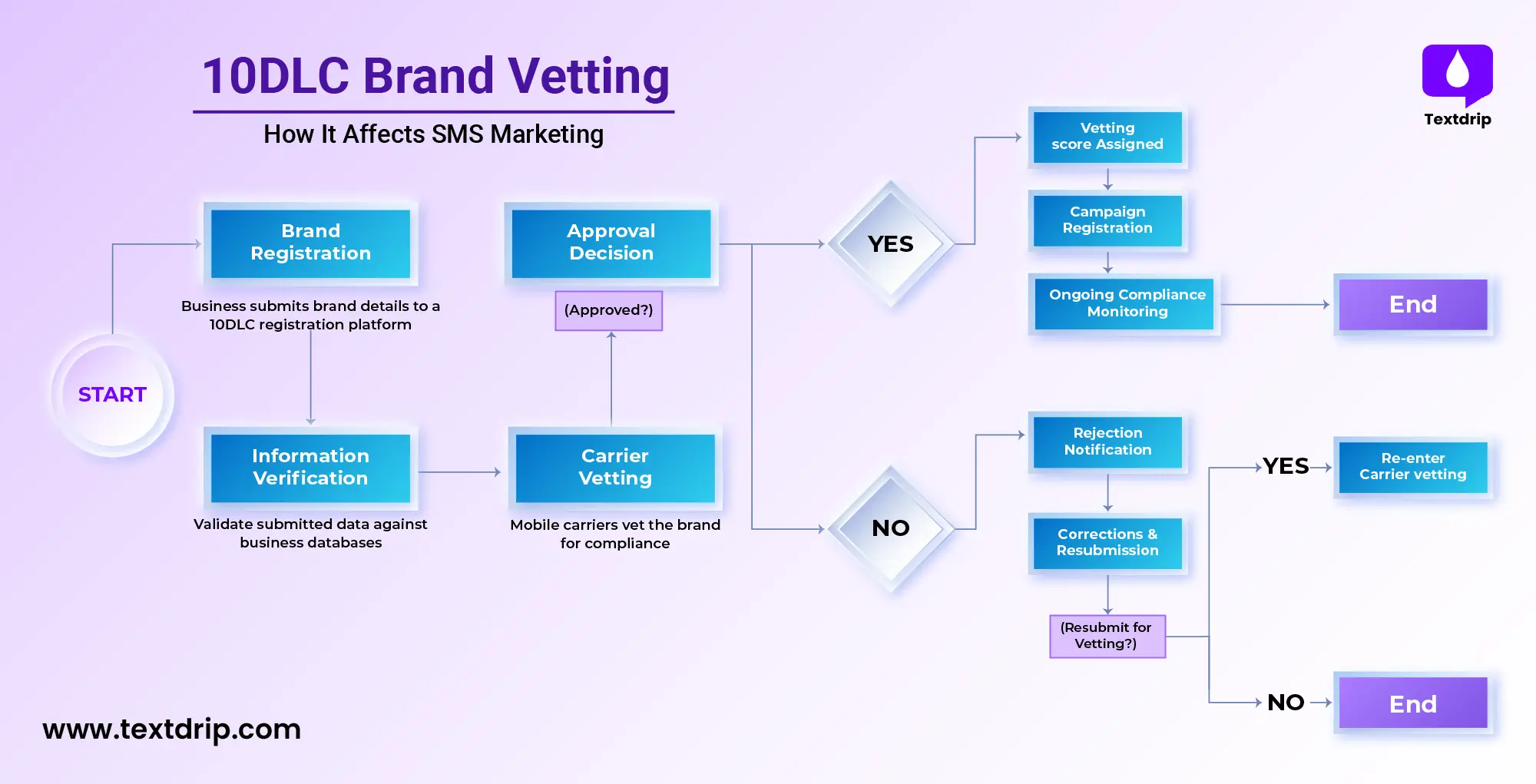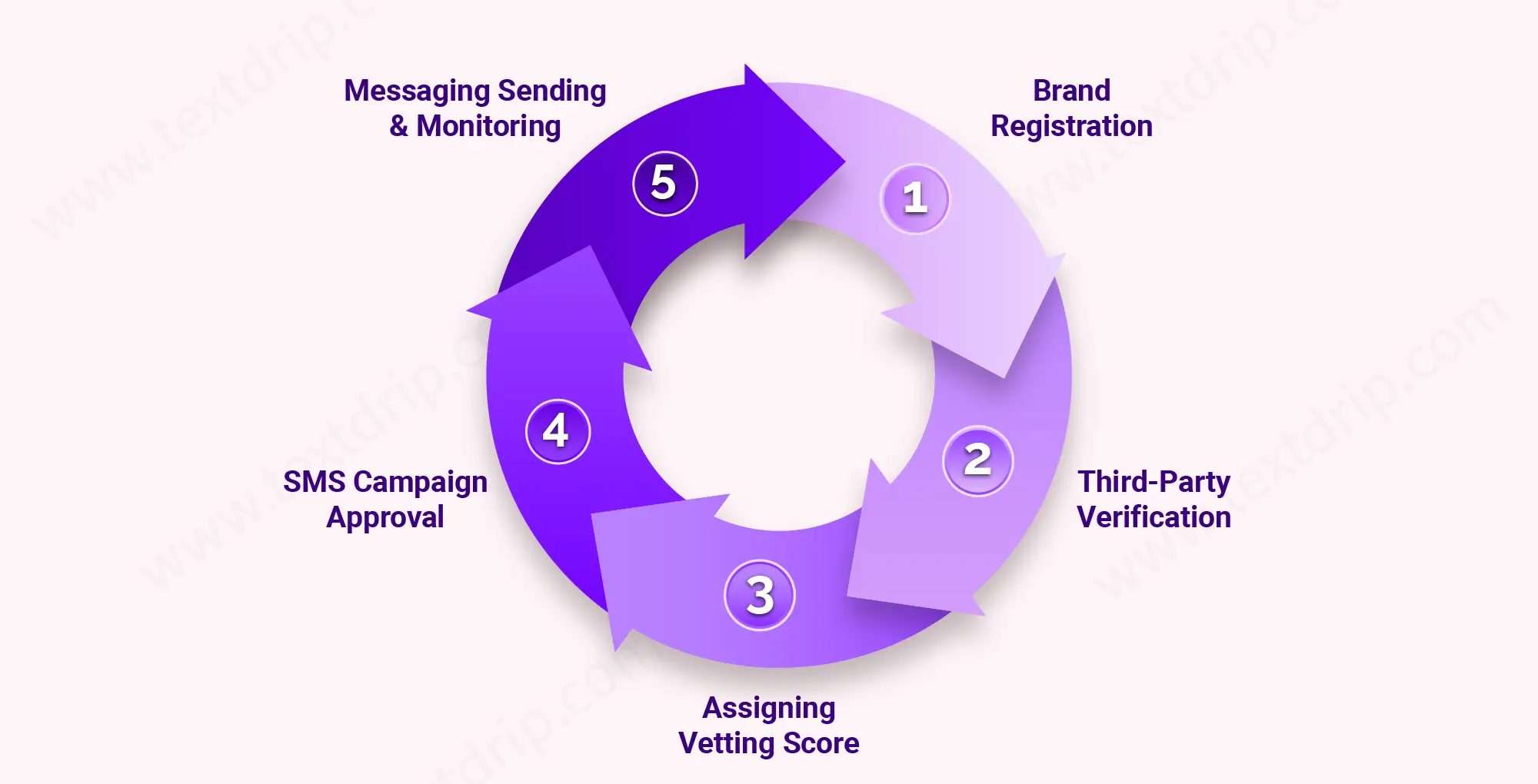31 Mar 2025
Philip Portman

31 Mar 2025
Philip Portman
Do you regularly use text messages to reach your customers? If yes! You must be aware of what is 10DLC. It is the 10-digit long code phone number which enables businesses to send a high volume of text messages. 10DLCs are specifically designed for business use, using a higher speed capacity and throughput. If you have successfully registered your company and now want to register a 10DLC campaign with higher throughput capabilities, it is compulsory that you vet your company registration. Understanding the 10DLC brand vetting process helps you optimize your 10DLC SMS campaigns, improve message deliverability, and maintain a strong reputation.
In this blog, we will cover what is 10DLC, why brand vetting is important, how the brand vetting process works, common challenges, how it impacts SMS marketing success, and much more. So, without further ado, let’s dive into it.
The 10DLC vetting process is an important step that businesses must undergo to ensure compliance and authenticity while using 10DLC for A2P messaging in the US. It is the background check process carriers use to verify a business’s identity and ensure compliance with text message regulations.
The process involves brand registration by providing details like business name, industry, aim of using messaging, and sample message content. Businesses must submit their brand and campaign details to the vetting authorities for 10DLC campaigns. The main goal here is to allow carriers to review and verify a business’s compliance with carrier guidelines, industry regulations, and best practices.
A brand vetting process determines a business’s credibility and assigns it a score which affects message throughput and delivery rates. The Higher Vetting Score = The More Messages a Business can Send Without Filtering or Delays.
The carriers and regulators introduced 10DLC brand vetting to create a reliable SMS ecosystem and prevent unsolicited, fraudulent, and spam messaging.
Here are a few reasons why brand vetting is essential.
Carriers follow strict text messaging rules. Therefore, vetting ensures that businesses comply with these regulations. Brand vetting filters out unreliable senders and protects consumers from spam, scams, and phishing attempts.
Brand vetting increases the deliverability rate because they experience fewer blocked messages. If the brand is vetted, it can enjoy better messaging throughput, which means it can send more messages per second (MPS).
The business must provide detailed information if it wants to complete the 10DLC brand vetting process. Here are a few key components of the brand vetting.
| Key Component | Description |
| Business Name | The legal name registered with the government authorities. |
| EIN | It is used to verify the business’s authenticity. |
| Business Type | LLC, Solo proprietorship, corporation, etc. |
| Physical Address | Required for identity verification |
| Company Website URL | A functional website helps verify legitimacy. |
| Industry and Use Case | It specifies the purpose of the SMS campaigns, such as marketing, notifications, customer support, etc. |
If a business fails to provide any of this information or the provided information is not accurate, it can delay or reject the brand vetting.
The 10DLC brand vetting process involves the following steps.

The first step is brand registration. Businesses must register their brand with TCR – The Campaign Registry via their SMS provider. It includes submitting their business details and campaign use cases.
Carriers use third-party vetting agencies to validate business details. After that, the vetting agency assigns a vetting score based on the credibility factors.
The vetting score decides the brand’s messaging throughput, which means how many messages they can send per second.
Businesses can register for their SMS campaigns once the brand vetting process is complete. Each campaign is reviewed thoroughly to ensure compliance with the carrier guidelines.
Once the SMS campaign is approved, businesses can send 10DLC SMS. However, carriers continue to monitor compliance to prevent customers from receiving spam messages.
Here are a few common challenges that businesses face in 10DLC brand vetting. Along with the challenges, we’ve covered how to overcome these challenges.
When you submit incorrect or incomplete business information, it can be the reason for vetting failures. Therefore, ensure you submit all accurate information which matches the official business records.
The low vetting score can limit your messaging capabilities. Therefore, if your business score is low, provide additional business documents. Ensure you use corporate domain email instead of the free email services. Make sure your website is active and professional.
Brand vetting can take time, so SMS campaigns can be delayed. Therefore, if you want to speed up the process, ensure you submit complete and accurate information from the start.
Some industries, such as financial services or healthcare, undergo strict inspections. If your creative SMS campaign is rejected, here are the possible reasons.
If your SMS campaign is rejected, make sure your messaging content follows carrier guidelines and 10DLC registration best practices. You should not use spammy words or any misleading promotions.
The vetting score is important in 10DLC brand vetting and is based on various factors. Let’s check out a few of them.
| Key Factor | What Does It Mean |
| Business Legitimacy | Generally, registered, tax-paying businesses score higher than newly formed entities. |
| Type of Industry | There are certain industries, such as gambling, CBD, healthcare, financial, etc., face stricter regulations. |
| Historical Messaging Behaviour | Businesses with a proven track record of compliant SMS campaigns get higher scores. |
| Use Case Risk Level | Promotional campaigns generally receive lower scores than transactional notifications. |
| Data Accuracy | If you submit incorrect business details, your vetting score will be lowered. |
A successful 10DLC brand vetting can optimistically affect SMS marketing. It offers the following benefits.
10DLC brand vetting is imperative for businesses that want to maximize their 10DLC SMS campaigns. Successful vetting helps businesses build trust, increase engagement rates, and drive more sales. It does this by ensuring 10DLC SMS compliance, improving deliverability, and increasing messaging throughput.
Therefore, if you want to achieve the best results from your SMS marketing strategy, you must provide accurate information, understand the 10DLC brand vetting process, and work with a reputable SMS provider like Textdrip. Remember, the reputed and well-vetted brand can enjoy improved deliverability, higher engagement, and a strong reputation in the SMS marketing world.
If you find 10DLC brand vetting confusing and need help navigating it smoothly, book a demo of Textdrip. This automated SMS marketing platform helps unlock the full potential of your SMS campaigns.
10DLC (10-digit long code) brand vetting is a process where businesses registering for A2P (Application-to-Person) messaging are evaluated based on legitimacy, use case, and compliance with carrier regulations before being approved to send SMS messages.
No, most U.S. carriers require businesses to complete brand vetting before sending A2P SMS via 10DLC numbers. Unvetted brands may face message filtering or restrictions.
A low vetting score may result in lower messaging throughput, increased filtering, or additional verification requirements. Businesses can reapply or provide more information to improve their score.
Yes, non-U.S. businesses can register for 10DLC if they send SMS to U.S. recipients. However, they must provide valid business documentation for vetting.